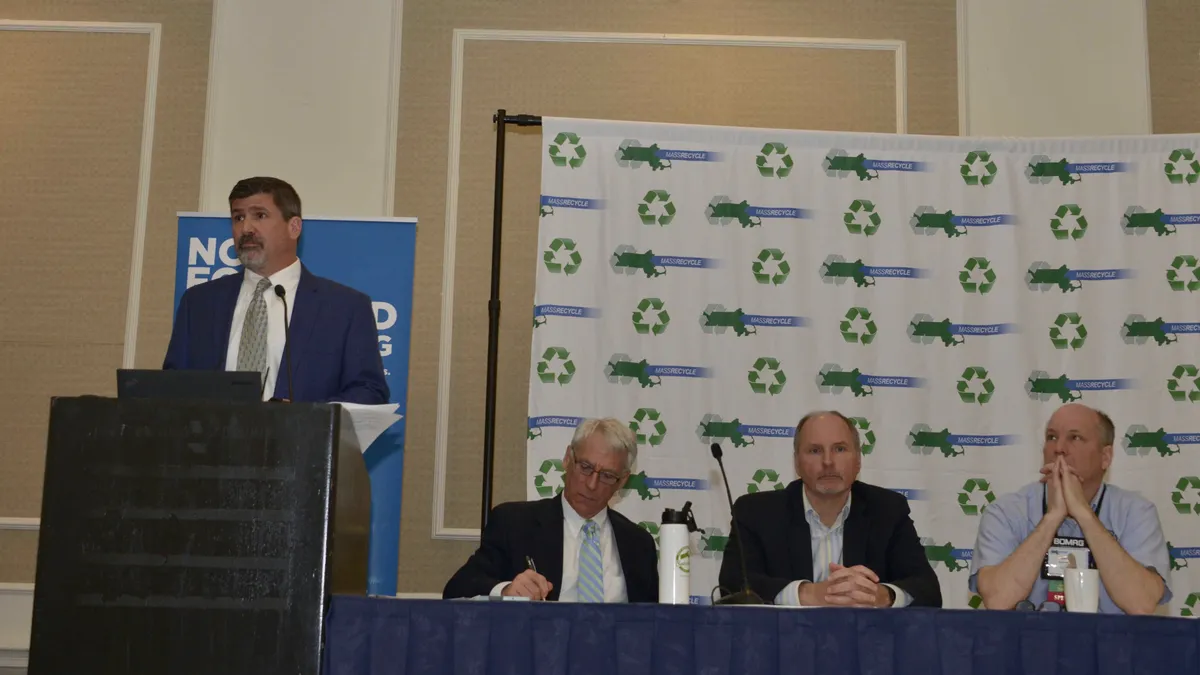As service providers and MRF operators ask for increasingly higher prices in the wake of commodity market shake-ups, some local government customers have been left feeling like their options are limited.
Over the past year-plus, there have been countless stories about double-digit rate increases; program reductions as a result of lack of funding; and inordinately tense, protracted negotiations. All involved believe they must protect their bottom line amid this changing financial situation, but figuring out how to do that in a mutually agreeable way can be challenging.
"This is complicated and difficult and there is no magic bullet," said attorney Thomas Mackie during a recent panel at the MassRecycle 2019 conference.
While Mackie highlighted existing joint guidance from SWANA and NWRA, as well as from the Massachusetts Department of Environmental Protection (MassDEP), the details are likely to be different on a case-by-case basis. Ongoing litigation between the city of New Bedford and ABC Disposal over contract terms was cited as a key cautionary tale.
While panelists all came at it from slightly different perspective, they shared many common themes around accountability and communication that can make contracts stronger in the future.
The private operator
Jim Nocella, Waste Management's area director for public sector solutions in New England, highlighted rising costs in quality control and shipping as key factors. While he pushed the industry stance that a new pricing structure is needed to address costs, he also said the market could adjust within the lifespan of a newly negotiated municipal contract that often runs 5-10 years.
"You should all be looking to have a portion of the upside if and when it ever comes," said Nocella.
From Waste Management's stance as an MRF operator, key terms and conditions for a sustainable contract include:
- Charging when commodity values don't cover processing costs, and offering rebates when they exceed them.
- Charging for material that doesn't meet quality specifications, plus having the right to audit loads for composition data and contamination rates.
- Having the right to "eliminate or dispose of commodities of no reasonable commercial market exists."
- Having the right to adjust for "material unforeseen" changes that affect markets, values or processing costs.
The city
Lowell, Massachusetts was recently on the receiving end of this strategy. Gunther Wellenstein, the city's solid waste and recycling coordinator, described a series of recent meetings with increasingly large contingents of corporate executives in recent months as terms were hashed out for Waste Management to continue accepting processing material at an area MRF. While the new deal is notably more expensive than in the past, Wellenstein said this must be viewed as a long-term investment.
"You can't time the expiration of your contract to the market," he said. "You can't read the tea leaves."
Wellenstein highlighted some of the new terms, along with advice for other municipalities facing their own rising costs:
- The new contract includes quarterly composition audits, penalties for both vendor and generator performance and an ongoing revenue share component.
- The contract includes $15,000 per year in education, which is a key focus for Lowell. Wellenstein estimates that every 10% of inbound contamination is costing the city upward of $100,000 per year.
- To address this contamination, he recommended working directly with haulers and processors to prioritize problem items via a concerted education and enforcement campaign. In addition to advertising, this also includes cart-tagging, which Lowell was among the first to pilot with The Recycling Partnership and MassDEP back in 2016.
- Wellenstein said it's most efficient to not just focus on problem contaminants by weight alone. For example, tanglers comprise only 1% of the unwanted material but are considered the most problematic item for the local MRF.
The state agency
In addition to its regulatory functions, MassDEP also has a unique role as a customer. The agency owns a Waste Management-operated MRF in Springfield that handles dual-stream material from 73 municipalities in western Massachusetts.
According to Greg Cooper, director of business compliance and recycling under the agency's Bureau of Air and Waste, Waste Management continues to honor the terms of its current contract despite revenue largely drying up. That deal is set to expire in 2020, so negotiations have already begun.
Cooper had many tips on how local governments can draw from the Springfield model and take responsibility for their finances:
- Have a direct contract with a MRF operator, or at least require that collection service providers demonstrate they have one. Otherwise, the entire fate of a recycling program can be disrupted.
- Regionalization can create more leverage for local governments due to the tonnage, while also potentially making the process more efficient for MRF operators.
- Ensure transparency is maintained from all sides around contract expectations and allow for some flexibility between parties. Situations in which there is "one party dictating to the other what's going to happen" often aren't sustainable.
- Account for processing costs, not potential revenue share, in municipal budgets. Cooper also said that if MRF operators continue to raise prices to cover their full processing costs before any commodity value is rebated — which, in his view, means they're shifting the burden of upfront risk — then municipalities should be sure to see their fair share of any eventual revenue share payout.
- Consider retained earnings account to help amass a back-up fund from any potential rebates to help with future market downturns.
"We will go through this again," said Cooper. "We’ve got to remember that it is a commodity — the markets will go up and down."














